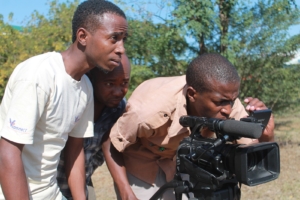How Netflix is Helping Underrepresented Creators

On August 23, 2022, Netflix announced that the Netflix Fund for Creative Equity was coming to Africa. Over the past few years, Netflix has endeavored to be a platform that supports marginalized groups that have underrepresented creators in the entertainment industry. The Netflix Fund for Creative Equity was the result of the efforts. The scope of its work first covered the U.S. followed by the U.K. and Canada, and now includes the African continent, beginning with Western and Central Africa.
The Creative Equity Scholarship Fund
Netflix launched the Fund on February 26, 2021. It was the result of a two-year research study by Netflix and Dr. Stacy L. Smith of the USC Annenberg Inclusion Initiative, a think tank that promotes research, advocacy and action for inclusion amd diversity in the entertainment industry. While great strides were occurring concerning gender equality, Netflix was lagging when it came to the representation of race, ethnic groups, the LGBTQ community and people with disabilities. As a result, Netflix provided $100 million for investment within the span of five years to create more opportunities for existing underrepresented creators and train new ones in the entertainment industry. The Fund also aims to support other organizations fighting for diversity inclusion by partnering up with them.
Netflix in Africa
In 2022, $1 million is supporting qualified students from five media schools and universities focused on television and film production. The Netflix Creative Equity Fund provides the scholarship and has partnered with Dalberg, a New York-based international consulting firm to manage its implementation. The schools in partnership with the fund are located in four African countries. These include:
- Nigeria: Nigeria is internationally well-known for the Nollywood entertainment industry. Therefore, it is unsurprising that two out of five film schools that Netflix is supporting are based in Nigeria. The schools include the National Film Institute in the city of Jos and the Pan-Atlantic University in Lagos. Both institutions have successful alumni in the African entertainment industry such as Chinedu Ikedieze & Tosin Ajibade.
- Ghana: The National Film and Television Institute of Ghana began in 1978 and is located in the capital city Accra. It draws a wide range of students from across the continent from 10 other African states including the kingdom of Eswatini (formerly Swaziland), South Africa, Zimbabwe, Zambia, Rwanda, Ethiopia, Cameroon, Nigeria, Gambia and Benin.
- Benin: l’Institut Supérieur des Métiers de l’Audiovisue otherwise known as ISMA began in 2006 in the city of Cotonou, Benin. It produces approximately 40 films a year and launched the first International Short Film Festival for Film Schools on the continent in 2017, a film festival that now takes place every year.
- Gabon: The Institut Philippe Maury de l’audiovisuel et du Cinéma is a film school part of the Gabon University group that emerged in 2010 and is located in Libreville, the capital city of Gabon.
Media is a powerful tool that shapes and changes lives and Netflix understands this. It provides the platform to show what is and is not possible to the poor, the marginalized and the underserved and underrepresented creators from the groups must have the opportunity to tell their own stories. In this way, people can better understand others from all walks of life, including their struggles and what is truly necessary in the world to better shape it and change it.
– Kena Irungu
Photo: Wikipedia Commons
